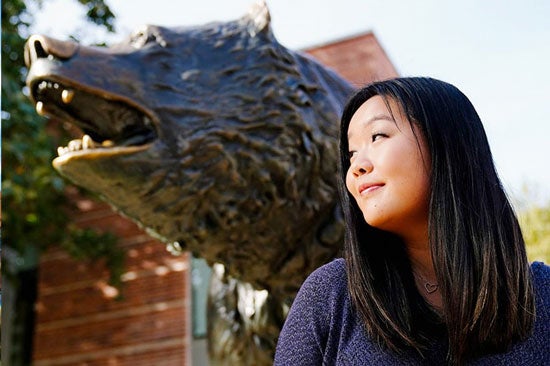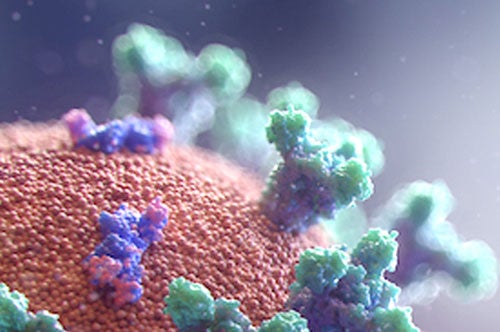
Guidance for research activities
To the Campus Community:
There are no confirmed cases of COVID-19 on the UCLA campus at this time, however, in anticipation of possible community spread, UCLA has suspended in-person classes and transitioned to remote learning platforms through the end of spring quarter. Visit the UCLA COVID-19 site for more information.
The focus of this communication is to provide additional guidance regarding your research activities.
With the ongoing concern about the spread of COVID-19, laboratories and research facilities should plan for the possibility of significant disruptions in routine operations. Each laboratory or research facility is best positioned to create a continuity plan that will meet its unique needs. This guidance is provided to facilitate the development of your plan, but is not intended to be all-inclusive; it is based on what is known at this time. I will update the research community as the situation develops and more information becomes available.
Research Continuity Guidance for Physical Laboratories and Research Facilities
Assumptions that you can use for planning, based on a scenario with widespread COVID-19 communal transmission:
- A significant percentage of your laboratory workforce may be out sick or unable to come to work.
- Essential research infrastructure, such as power and telecommunications, will be maintained.
- The Division of Laboratory Animal Medicine (DLAM) and Environment, Health & Safety (EH&S) personnel will maintain their essential research support functions, although some lower-priority services may need to be curtailed (e.g., less frequent waste pick-up by EH&S, fewer DLAM-led vivarium walk-throughs and researcher training classes).
- Orders for critical supplies may be delayed, for example, due to departmental staff absences or supply chain interruptions.
- Processing of visas by the federal government may be delayed, resulting in delayed appointments.
- Core facilities and other fee-for-service resources may not be available.
Steps you can take now to ensure continuity of critical functions:
- Identify procedures and processes that require regular personnel attention (e.g., cell culture maintenance, animal studies).
- Assess and prioritize critical laboratory activities, including care for animals housed in your laboratory.
- Identify any research experiments that can be ramped down, curtailed or delayed.
- For research involving animals, consider delaying animal ordering and imports, and cease or reduce breeding activities.
- With classes moving to remote instruction through the next quarter, undergraduate student workers are not expected to report for laboratory duties and their tasks should be covered accordingly.
- Identify personnel able to safely perform essential activities and cross-train research staff to fill in for others who may be out sick or unable to come to work.
- Communicate any need for DLAM support or technical services promptly.
- Identify how the viability of laboratories, stored materials, animals, etc. will be monitored and addressed in the event regular staff cannot be there in the normal manner.
- Ensure that you have emergency contact information for your critical staff, including cell phone numbers; develop a communication plan.
- Ensure you are documenting critical step-by-step instructions in your Standard Operating Procedures.
- Coordinate with colleagues who have similar research activities to identify ways to ensure coverage of critical activities.
- Review and test contingency plans and emergency procedures with researchers and staff.
- Important considerations for lab work as well as human subjects research contingency plans should focus on maintaining a safe distance between people, which can be accomplished utilizing technology, such as online video/teleconferencing, as an alternative to reduce nonessential in-person interactions.
- Maintain a sufficient inventory of critical supplies that may be impacted by global shipping delays.
- Identify and consider your ability to work with limited quantities (or completely without) common perishable items, such as dry ice, liquid nitrogen and various gas cylinders.
- Communicate significant planned absences and/or lab closures to your EH&S Research Safety representatives, business offices, DLAM and other key administrative units.
- Prioritize. Depending upon the nature of your research, consider prioritizing work that can only be carried out in your research facility, and put off work amenable to remote support, such as data analysis. Stockpiling results and data now that could be analyzed remotely in the future is a potential option that might create future flexibility.
Remote access:
- Ensure that those involved in research projects have access to information they need to carry out work remotely (e.g., access to literature, computational resources, existing datasets and research-related files, for example using Box and meeting software such as Zoom).
- Access to Hoffman2 computation and data storage resources, mobile web resources and statistics consultation managed through the Office of Information Technology will continue to be available.
- Check that any department computational and data storage resources will be available and, if so, ensure remote access.
- While UCLA Libraries remain open and fully operational, currently scheduled in-class training sessions and requests for new consultations and training sessions may be handled remotely.
- Review this handout on backing up and protecting research data (PDF).
- Test and update remote work technologies such as VPN, Box and Zoom conferencing.
- Ensure that remote access (e.g., the use of a personally owned computer) complies with security and privacy requirements for access and data to safeguard UCLA resources, most especially when data are sensitive or restricted.
- The UC Office of the President has stated that under no circumstances are researchers to take materials other than laptops, data storage devices, etc., offsite (e.g., to their homes).
Measures you can take to prevent the spread of illness among your group:
- Wash your hands often with soap and warm water for at least 20 seconds. Use an alcohol-based hand sanitizer that contains at least 60 percent alcohol if soap and water are not available.
- Avoid touching your eyes, nose and mouth with unwashed hands.
- Implement measures to reduce density and allow distancing of lab/research personnel. For example, increasing spacing between researchers where possible to more than 6 feet, having personnel come to the lab in shifts, allowing every other bench to be unoccupied, etc.
- Avoid close contact with people who are sick.
- Self-isolate and do not travel or go to work or school when you are sick.
- Cover your mouth and nose with a tissue when you cough or sneeze then throw the tissue in the trash. Then wash your hands with soap and water.
- Clean and disinfect frequently touched objects and surfaces in your workplace.
Research safety:
- Safety is critical, and with the potential for unexpected absences, it is important that research activities be left in a safe state daily.
- Experiments should be left each day in a stable mode such that they do not present any biological, chemical or physical hazards in case of a prolonged absence. Further, experiments must incorporate “fail-safe” measures; that is, in the event that a member of the research team is not able to return to the lab the next day, or if there is a failure of air supply, cooling, power, water supply, vacuum or other connection, the experiment should not create hazardous conditions.
- Outside of active experiments, biological, chemical and radiological materials and equipment must be secured in a safe manner. Physically hazardous equipment (cryogenic, heated, pressurized, under vacuum, etc.) similarly must be maintained in a safe state.
Questions and requests for assistance regarding research safety can be addressed to UCLA Environment, Health & Safety:
Main Phone: 310-825-5689
EH&S Hotline: 310-825-9797
Biosafety Consultations: biosafety@ehs.ucla.edu
Chemical Consultations and Lab Safety: laboratorysafety@ehs.ucla.edu
Radiation Safety: 310-825-5396 or radiationsafety@ehs.ucla.edu
Request for an experiment safety review
Hazardous Waste: 310-206-1887 or hazardousmaterials@ehs.ucla.edu
Research continuity summary:
Advance planning will allow everyone in your research group to focus on their own efforts and work together as a team, rather than wondering how they and their team members are to proceed.
Quick Checklist:
- Identify critical lab operations.
- Identify critical lab personnel and ensure they know what to do in the event of suspended operations.
- Remind lab personnel of your communication plan or create one if not in place.
- Ensure remote access to files, data, servers, etc.
- Identify and follow appropriate data back-up and security protocols.
- Prioritize experiments.
- Leave experiments in a safe state at the end of each day.
- Cancel nonessential travel and check travel restrictions before making travel plans. Check UCLA’s updated travel guidance.
COVID-19 Research on Campus
Under UCLA Policy 992, any research group that plans to conduct research with SARS-CoV-2 must obtain Institutional Biosafety Committee (IBC) approval prior to beginning any such research. As part of the IBC review process, a full risk assessment would be conducted to ensure worker safety and agent containment.
Travel
Please know that all UCLA nonessential international and domestic travel is suspended until further notice and personal international and domestic travel is strongly discouraged. Anyone arriving from CDC Level 3 countries must self-quarantine for 14 days from the time they left that country. If you decide to travel, be aware that other countries could change travel restrictions without notice, flights may be canceled or new re-entry restrictions could be imposed when returning to the United States. There are no current restrictions on domestic travel, but you should be aware of preventative measures as you travel domestically.
UCLA Research Administration
UCLA Research Administration and all of its offices are fully operational and have contingency plans in place to maintain continuity of services even if personnel are working remotely. Our Office of Research Information Services (ORIS) will continue to support our central research administration systems to ensure ongoing operations.
- The Office of Contract and Grant Administration (OCGA) will continue to review and submit proposals, accept awards, issue sub awards and manage communications with sponsors. Cayuse, EPASS, PI Portal, ORA Resource Center, and other systems will be available as usual.
- Extramural Fund Management (EFM) will continue to submit financial reports and invoices, process close-outs, manage reimbursements and provide financial management support for grant and contract funds. EFM systems will remain on line in conjunction with the financial systems.
- We expect federal agencies to continue to provide services, and to be flexible about deadlines as needed in emergency situations. If agencies are officially closed, we will continue to do what we can, understanding that transactions will likely remain in queue until agency operations are resumed. We will continue to work with state, county, city and nonprofit sponsors as possible. Additional information will be posted on the ORA, OCGA and EFM websites as new information is obtained.
- NSF has developed a new website for the research community with detailed guidance on COVID-19. This includes guidance for awardee organizations, researchers and reviewers of NSF proposals.
- The Office of the Human Research Protection Program (OHRPP) and the Research Safety & Animal Welfare Administration (RSAWA) will continue to operate as usual, including convening regular meetings of the Institutional Review Boards (IRB), Animal Research Committee (ARC), Institutional Biosafety Committee (IBC) and Radiation Safety Committees (RSC). Our WebIRB, RATS, and SafetyNet systems can be accessed anywhere an individual has internet access. Similarly, the OHRPP and RSAWA staff have the capability to conduct faculty committee meetings via Zoom as needed.
- As a reminder, all changes/modifications to research protocols still need to be reviewed and approved by the relevant oversight committee, except for incorporation of a COVID-19 screening protocol and addition of measures needed to avoid an immediate apparent hazard to a patient/participant. If a research protocol requires modification due to COVID-19 implications, contact OHRPP directly so those submissions can be triaged in an expeditious manner.
- For any questions or concerns related to your protocols, contact the OHRPP office or RSAWA office.
Clinical Research Activities
Existing studies that meet the definition of an NIH Clinical Trial (PDF) should proceed if the benefit to study participants outweighs the risks of participation. PIs can reach out to OHRPP staff if they have questions about participant risk and benefit. All research teams are urged to assess study visits with PIs, protocols and sponsors, and assess if visits can be conducted through telephonic or video-conferenced methods without increased risk or compromise of safety of research subjects; otherwise, research participants should come to UCLA for their study visits just as they would for routine clinical care. Study team-participant interaction should be restricted only to essential staff. The Office of Clinical Research is fully operational and has contingency plans in place to maintain continuity. The Oncore Clinical Research Management System can be accessed anywhere an individual has internet access. Contact our staff at ResearchGo@mednet.ucla.edu or visit the UCLA CTSI Research Go COVID-19 INFO page for more detailed information.
My office stands ready to support you in planning to ensure that your research activities continue with as little impact as possible. If you have questions, or if there is additional guidance you would like to see provided, please contact C19@research.ucla.edu.
Sincerely,
Roger M. Wakimoto, Ph.D.
Vice Chancellor for Research and Creative Activities


